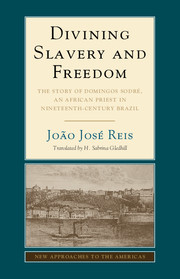 Divining Slavery and Freedom
Divining Slavery and Freedom Published online by Cambridge University Press: 05 May 2015
Domingos' HOME, PARISH, AND CITY
The police chief, João Antônio de Araújo Freitas Henriques, took the complaint from customs official José Egídio Nabuco against Domingos Sodré's candomblé very seriously. Chief Henriques ordered a raid headed by Pompílio Manoel de Castro, the acting subdelegado of São Pedro Velho parish, where Domingos lived. The subdelegado was accompanied by two constables, José Thomas Muniz Barreto, a small jeweler, and Adriano Pinto, whose occupation I have been unable to ascertain. He was a neighbor of the African freedman. In addition to these men, the officials present during the search included Lieutenant Colonel Domingos José Freire de Carvalho, none other than the commander of the police, which would supply the physical force for the operation – each officer would be armed with a rifle and a pistol – as the subdelegados, as a rule, did not have any armed police under their command. The entire operation reflects how seriously the chief of police had taken the complaint.
The complainant had sent Chief João Henriques detailed information about where to find Domingos Sodré. He lived in a two-story townhouse on 7 Ladeira de Santa Tereza, a narrow, sloping street connecting Rua de Baixo de São Bento (now Rua Carlos Gomes) and Rua do Sodré, which was named after Domingos' master's family. From the corner of Ladeira de Santa Tereza and Rua do Sodré, the freedman could have seen the eighteenth-century manor that once had belonged to the Sodré family and was now the home of the famous abolitionist poet Antonio de Castro Alves's family. It was just a short distance away, which means that the poet and the freedman were neighbors. Even if they were unaware of each other's existence, the slaves in the abolitionist's household – namely two litter bearers, Augusto and Pedro, a cook, Martinha, and a maid, Vitória, all of whom were African, and a creole washerwoman, Lucrecia – probably knew Domingos and heard about his arrest in 1862. They may even have witnessed the commotion that the incident must have caused.
To save this book to your Kindle, first ensure [email protected] is added to your Approved Personal Document E-mail List under your Personal Document Settings on the Manage Your Content and Devices page of your Amazon account. Then enter the ‘name’ part of your Kindle email address below. Find out more about saving to your Kindle.
Note you can select to save to either the @free.kindle.com or @kindle.com variations. ‘@free.kindle.com’ emails are free but can only be saved to your device when it is connected to wi-fi. ‘@kindle.com’ emails can be delivered even when you are not connected to wi-fi, but note that service fees apply.
Find out more about the Kindle Personal Document Service.
To save content items to your account, please confirm that you agree to abide by our usage policies. If this is the first time you use this feature, you will be asked to authorise Cambridge Core to connect with your account. Find out more about saving content to Dropbox.
To save content items to your account, please confirm that you agree to abide by our usage policies. If this is the first time you use this feature, you will be asked to authorise Cambridge Core to connect with your account. Find out more about saving content to Google Drive.